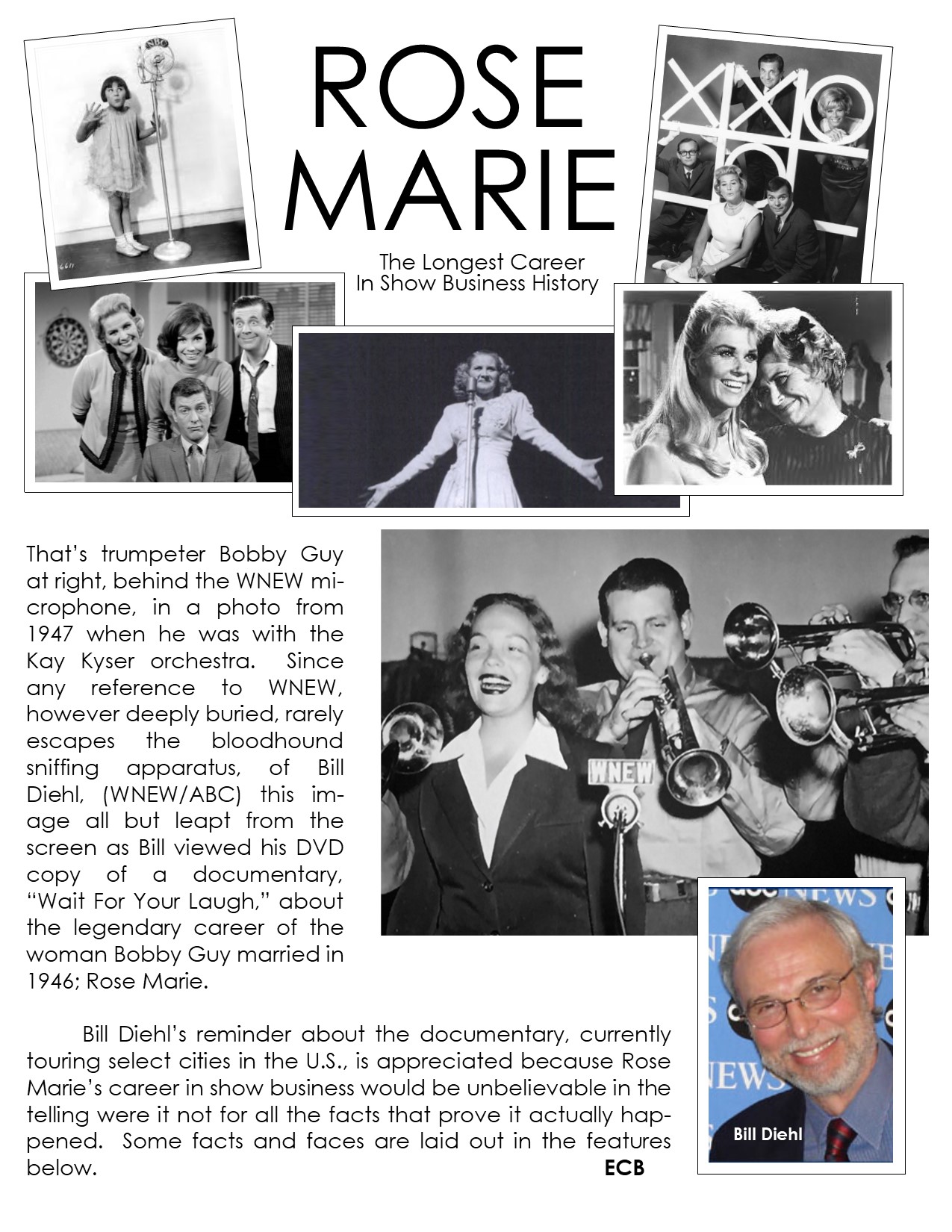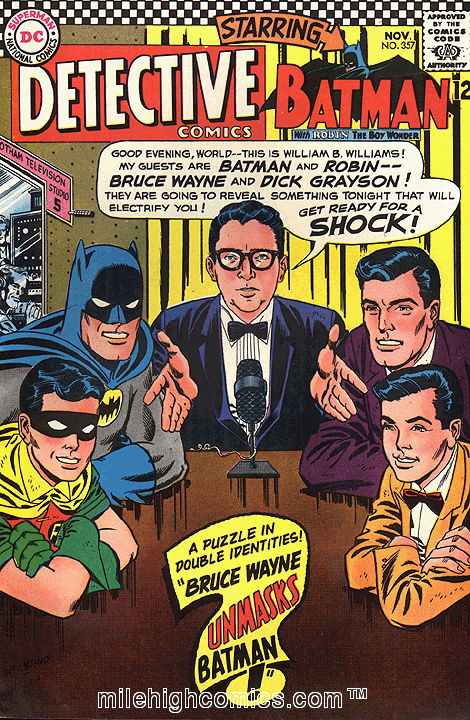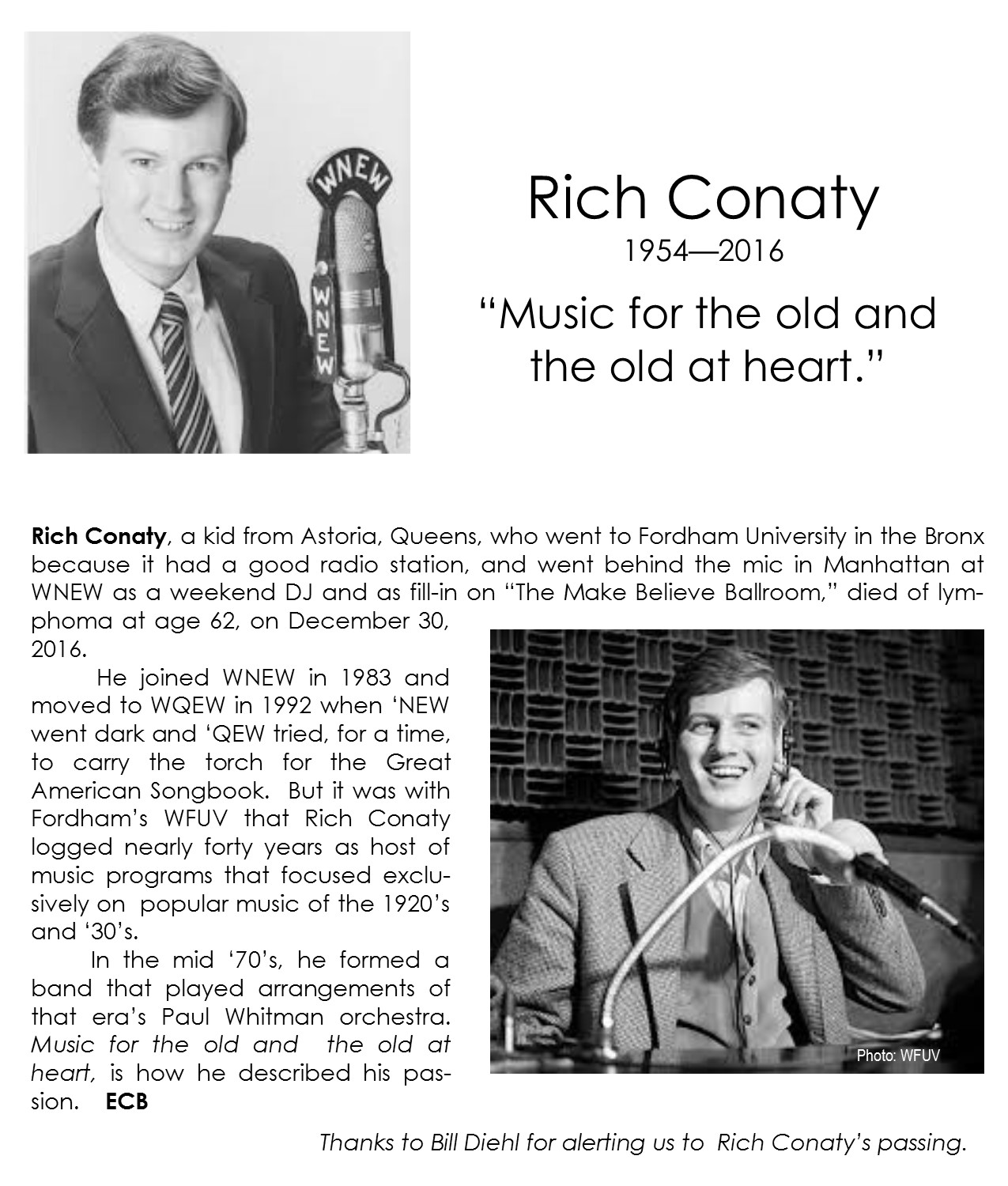Showbiz legend, Rose Marie, died yesterday, December 28, at age 94. It was just a month ago when a feature appeared here about a documentary of her life and career then touring select movie house across the country.

Showbiz legend, Rose Marie, died yesterday, December 28, at age 94. It was just a month ago when a feature appeared here about a documentary of her life and career then touring select movie house across the country.




For more on Rich Conaty, see NY Times story below and link to WFUV website
Mr. Conaty was 62 and had worked in radio for 43 years. The center of his life, his great achievement, was “The Big Broadcast,” his show of jazz and pop from the 1920s and 30s. He started it at WFUV, Fordham University’s station, which he joined as a freshman in 1973, and gave his last live broadcast in September. Except for a few years at WQEW in the 1990s, he stayed at WFUV, playing songs from his vast personal library of 78s, taking not a lot of money, giving lots of listeners a happy education in Sophie Tucker, Cab Calloway, Bing Crosby, Rudy Vallee, Cliff Edwards (Ukulele Ike) and Isham Jones.

His slot was Sunday nights, 8 to midnight. I could think of no better company for a long drive home from a late shift or a weekend out of town. Mr. Conaty, a man of steady habits, would open with a song or two, then play the same snippet of an ebullient Fats Waller tune. “I’ve looked the universe over, from wacky Nagasaki to Dover, and now that we have met how sweet it seems! I love you more the more I know you, which only goes to show you: You meet the nicest people in your dreams.”
“Thank you, Fats,” Mr. Conaty would say.
Mr. Conaty stayed in his musical lane: those two decades, no others. His devotion was strict but without affectation; you’d never picture him in spats. He was just a New York guy who loved this music to death, the gems of a genre that is largely forgotten or trapped in period cliché. “He was trying to point out the timelessness of it, the universality of it,” said his friend Marshall Crenshaw, the singer and songwriter, who has a WFUV show of his own. “Rich had this spark about him,” Mr. Crenshaw told me. “You could tell that somebody was home upstairs. He wasn’t locked into some obsession with the past.”
WFUV, at 90.7 FM, is an eclectic station. Serving hipsters is its day job, but weekends and wee hours it stretches out — into contemporary folk, Catholic Mass, Fordham sports and various musical veins mined by old-style D.J.s who know and play what they like.
Like his colleagues, Mr. Conaty wore his expertise lightly. His voice always wore a smile, though he had an odd tendency toward self-deprecation, which often made me think: Here is a sad soul. For all the years I listened in, I didn’t know much about him. He’d had a wife, whom he warmly called “Manhattan Mary.” She died in 2009. He would speak of visiting his mother, in Florida, but had no siblings or other close relatives. I later learned he lived in the Hudson Valley, two hours up the Taconic Parkway from the Bronx. For a while he drove a bus for an organization for adults with developmental disabilities.
Mr. Conaty was an efficient D.J.: He gave you song titles and artists’ names, and dates of birth and death, but mostly he gave you music. Hearing his birthday tributes to dead musicians made you aware of the cruel limits of the human life span but also of the uncanny ability of good songs to live outside of time. Before he got sick, Mr. Conaty had been anticipating his 50th radio anniversary, and mused about hanging it up then. Cancer robbed him of his plans, and saddened listeners like me who lost a chance to say, back to him, the one word that was his “Big Broadcast” signoff: Aloha.

Frank Sinatra / Harry James orchestra “All Or Nothing At All”

Nearly all information used in “No, Ed Wynn Didn’t Do It,” came through internet links. Those listed below are only some of those consulted because sources with certain types of duplicated or uncontested information are not listed. It’s worth noting that misinformation and misinterpreted information abound through the internet, to which this effort has no doubt contributed.
Quest For A Third Network: Richard Ward, dept of comm. Univ. of south alabama http://pcasacas.org.seanic11.net/SiPC/25.1/Ward.pdf
WBNX-Amalgamated Broadcasting http://jeff560.tripod.com/am8.html
Broadcasting: march 1933, wynn announces network effort
Broadcasting: mutual started in September 1934 http://earlyradiohistory.us/1941cb04.htm
The Secret Story of Ed Wynn’s Greatest Mistake: http://earlyradiohistory.us/1934mis.htm
Broadcasting: amalgamated network gets started oct 1933 http://earlyradiohistory.us/1933amal.htm
Broadcasting: directory of broadcasting stats of the united states broadcasting yearbook 1939
Amalgamated Network Gets Started http://earlyradiohistory.us/1933amal.htm
Ed Wynn https://en.wikipedia.org/wiki/Ed_Wynn
Google Books: Elizabeth McLeod, Tonight The Program’s Gonna Be Different: The Life and Times of Ed Wynn
Amalgamated Broadcasting System: https://en.wikipedia.org/wiki/Amalgamated_Broadcasting_System
Where The Melody Lingers On: WNEW 1934-19984:Nightingale Gordon, NY
Milton Biow: Milton Biow: http://www.jewishvirtuallibrary.org/
Milton Biow: Biow Co. Advertising Age: http://adage.com/article/adage-encyclopedia/biow/98349/
Arde Bulova: History of Bulova Corp. http://www.fundinguniverse.com/company-histories/bulova-corporation-history/
WAAM: chronology of call letters: http://broadcasting.wikia.com/wiki/Chronology_of_call_letters_WAAM
WODA: chronology of call letters: http://broadcasting.wikia.com/wiki/Chronology_of_call_letters_WODA
WNEW: chronology of call letters: http://broadcasting.wikia.com/wiki/Chronology_of_call_letters_WNEW